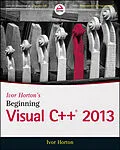Learn C++ with the best tutorial on the market!
Horton's unique tutorial approach and step-by-step guidance have
helped over 100,000 novice programmers learn C++. In Ivor
Horton's Beginning Visual C++ 2013, Horton not only guides you
through the fundamentals of the standard C++ language, but also
teaches you how C++ is used in the latest Visual Studio 2013
environment. Visual Studio 2013 includes major changes to the IDE
and expanded options for C++ coding. Ivor Horton's Beginning
Visual C++ 2013 will teach you the latest techniques to take
your Visual C++ coding to an all-new level.
* C++ language and library changes supported under Visual Studio
2013
* IDE-specific changes for code formatting and debugging
* Changes to the C++ Standard Language for both C++ 11 and the
new C++ 14
* And more
Horton introduces you to both Standard C++ and Visual C++ so you
can build any component your app requires. Ivor Horton's
Beginning Visual C++ 2013 is an indispensable guidebook for any
new programmer, and contains plenty of exercises and solutions to
help programmers of any level master the important concepts quickly
and easily.
Autorentext
Ivor Horton is one of the preeminent authors of tutorials
on the Java, C, and C++ programming languages. He is widely known
for the tutorial style of his books, which provides step-by-step
guidance that is easily understood. His Beginning Visual C++
books have sold more than 100,000 copies. Horton is also a systems
consultant in private practice.
Zusammenfassung
Learn C++ with the best tutorial on the market!
Horton's unique tutorial approach and step-by-step guidance have helped over 100,000 novice programmers learn C++. In Ivor Horton's Beginning Visual C++ 2013, Horton not only guides you through the fundamentals of the standard C++ language, but also teaches you how C++ is used in the latest Visual Studio 2013 environment. Visual Studio 2013 includes major changes to the IDE and expanded options for C++ coding. Ivor Horton's Beginning Visual C++ 2013 will teach you the latest techniques to take your Visual C++ coding to an all-new level.
- C++ language and library changes supported under Visual Studio 2013
- IDE-specific changes for code formatting and debugging
- Changes to the C++ Standard Language for both C++ 11 and the new C++ 14
- And more
Horton introduces you to both Standard C++ and Visual C++ so you can build any component your app requires. Ivor Horton's Beginning Visual C++ 2013 is an indispensable guidebook for any new programmer, and contains plenty of exercises and solutions to help programmers of any level master the important concepts quickly and easily.
Inhalt
Introduction xxxiii
Chapter 1: Programming with Visual C++ 1
Learning with Visual C++ 1
Writing C++ Applications 2
Learning Desktop Applications Programming 3
The Integrated Development Environment 6
Using the IDE 8
Summary 23
Chapter 2: Data, Variables, and Calculations 25
The Structure of a C++ Program 26
Defining Variables 38
Fundamental Data Types 40
Basic Input/Output Operations 47
Calculating in C++ 52
Type Conversion and Casting 63
The auto Keyword 65
Discovering Types 66
The Bitwise Operators 67
Introducing Lvalues and Rvalues 72
Understanding Storage Duration and Scope 72
Variables with Specific Sets of Values 79
Namespaces 83
Summary 86
Chapter 3: Decisions and Loops 91
Repeating a Block of Statements 109
Summary 127
Chapter 4: Arrays, Strings, and Pointers 129
Handling Multiple Data Values of the Same Type 129
Working with C-Style Strings 140
Indirect Data Access 146
Dynamic Memory Allocation 163
Using References 168
Library Functions for Strings 171
Summary 176
Chapter 5: Introducing Structure into Your Programs 179
Understanding Functions 179
Passing Arguments to a Function 188
Returning Values from a Function 206
Returning a Pointer 206
Recursive Function Calls 214
Summary 217
Chapter 6: More about Program Structure 221
Pointers to Functions 221
Initializing Function Parameters 228
Exceptions 229
Handling Memory Allocation Errors 235
Function Overloading 237
Function Templates 241
Using the decltype Operator 244
An Example Using Functions 246
Summary 264
Chapter 7: Defining Your Own Data Types 267
The struct in C++ 267
Types, Objects, Classes, and Instances 276
Understanding Classes 279
Class Constructors 287
Private Members of a Class 297
The Pointer this 304
Const Objects 306
Arrays of Objects 309
Static Members of a Class 310
Pointers and References to Objects 314
Summary 318
Chapter 8: More on Classes 323
Class Destructors 324
Implementing a Copy Constructor 329
Operator Overloading 331
The Object Copying Problem 351
Default Class Members 361
Class Templates 362
Perfect Forwarding 373
Default Arguments for Template Parameters 376
Aliases for Class Templates 381
Template Specialization 382
Using Classes 385
Organizing Your Program Code 403
Library Classes for Strings 405
Summary 427
Chapter 9: Class Inheritance and Virtual Functions 431
Object-Oriented Programming Basics 432
Inheritance in Classes 433
Access Control Under Inheritance 437
The Copy Constructor in a Derived Class 447
Preventing Class Derivation 450
Class Members as Friends 451
Virtual Functions 453
Casting Between Class Types 470
Summary 475
Chapter 10: The Standard Template Library 479
What Is the Standard Template Library? 479
Smart Pointers 485
Algorithms 488
Function Objects in the STL 489
Function Adapters 490
The Range of STL Containers 490
Sequence Containers 490
Associative Containers 543
More on Iterators 556
More on Function Objects 562
More on Algorithms 564
